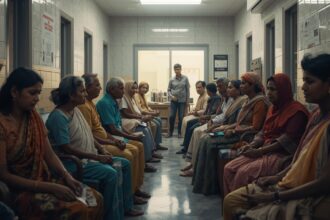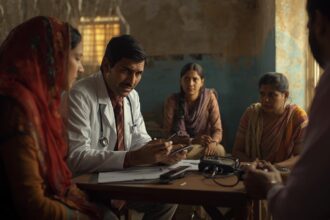India’s healthcare landscape is constantly evolving, and today has brought a series of important developments that impact patients, healthcare professionals, and policy makers alike. From initiatives to make drug abuse treatment more accessible, to the expansion of primary care centers, to raising awareness about overlooked health issues such as hearing loss, the medical news today reflects both challenges and progress.
1. Punjab Expands Access to Drug Abuse Treatment
Substance abuse continues to be a serious public health crisis in India, particularly in Punjab. Today, Health and Family Welfare Minister Dr. Balbir Singh announced a new strategy under the “Yudh Nashian Virudh” campaign to ensure standardized and accessible treatment across the state.
The plan involves:
- Setting up model de-addiction centers in Amritsar and Kapurthala.
- A hub-and-spoke model connecting district hospitals and primary centers.
- Partnerships with premier institutions like AIIMS, PGI Chandigarh, and IIT Ropar.
- Specialized training for medical officers.
This approach combines medical treatment with psychosocial support and community outreach, aiming to reduce stigma and provide a comprehensive solution to drug dependence.
2. Chennai Doctor’s Death Sparks Debate on Work-Life Balance
In a tragic incident, Dr. Gradlin Roy, a 39-year-old cardiac surgeon in Chennai, collapsed and died while on duty. His sudden passing has shaken the medical community and reignited the conversation on work-life balance among healthcare workers.
Doctors often endure long hours, high stress, and inadequate rest, which can lead to burnout, hypertension, and even sudden cardiac events. This incident is a sobering reminder that:
- Healthcare workers also need care.
- Hospitals must implement structured shifts and mandatory rest periods.
- Awareness about occupational health risks needs to increase.
Workplace wellness is not just a personal choice—it is a systemic issue that requires policy intervention.
3. Delhi High Court Secures Treatment for a Ventilator-Dependent Child
The Delhi High Court stepped in to safeguard the rights of a 12-year-old boy dependent on a ventilator. By ordering that the child be placed under the Economically Weaker Section (EWS) category, the court ensured that he continues to receive treatment at a private hospital free of cost.
This ruling emphasizes two key issues:
- Equity in healthcare access – critical care should not depend solely on financial capacity.
- System reforms needed – the court recommended better ICU bed allocation systems and digital transparency through hospital management platforms.
It is a landmark example of the judiciary’s role in bridging healthcare gaps.
4. The Silent Epidemic of Hearing Loss
Hearing loss is increasingly recognized as a silent epidemic in India. Millions suffer from partial or complete hearing impairment, yet stigma and lack of awareness keep it underdiagnosed and undertreated.
Key concerns include:
- Late diagnosis due to limited screening programs.
- Social stigma preventing people from seeking hearing aids or implants.
- Mental health impact, as untreated hearing loss leads to isolation and depression.
Experts are calling for:
- Mandatory hearing screenings at schools and workplaces.
- Subsidies for affordable treatment.
- National awareness campaigns to reduce stigma.
Tackling this issue can drastically improve quality of life for millions.
5. Delhi to Open 100 Arogya Mandirs Every Month
In a major push toward strengthening primary healthcare, the Delhi government announced that 100 Ayushman Arogya Mandirs will be launched every month.
These centers will offer:
- Maternity and child health services.
- Mental health consultations.
- Dental and eye care.
- Elderly care and chronic disease management.
- Lab facilities and emergency response units.
This initiative reduces dependency on overburdened hospitals and ensures healthcare is accessible closer to home.
6. MoD Grants Healthcare Access to Disabled Cadets
The Ministry of Defence (MoD) announced today that officer cadets who suffer service-related medical disabilities during training will now have access to Ex-Servicemen Contributory Health Scheme (ECHS) facilities.
Benefits include:
- Free outpatient services.
- Cashless treatment at empanelled hospitals.
Although limited to cadets (excluding family members), this decision ensures that those injured while preparing to serve the nation are not denied healthcare support.
Key Themes Emerging from Today’s Updates
- Healthcare Equity: From drug addiction support in Punjab to judicial interventions in Delhi, ensuring access for vulnerable populations remains a central theme.
- Preventive Health: Expanding Arogya Mandirs and tackling hearing loss show a shift toward prevention and community-based care.
- Workplace Health: The Chennai doctor’s death is a reminder that health systems must also safeguard their workforce.
- Policy Support: Government and court-led interventions are driving systemic change, though execution will be the real test.
Conclusion
Today’s medical and health updates highlight a mix of progress and pressing challenges in India’s healthcare sector. Efforts like Punjab’s drug treatment model and Delhi’s Arogya Mandirs show the government’s focus on expanding access. Meanwhile, the Delhi High Court’s intervention reflects the judiciary’s role in protecting health rights. At the same time, issues like physician burnout and neglected conditions such as hearing loss call for deeper systemic reforms.
India’s health system is clearly moving in the right direction, but it must ensure sustainability, equity, and awareness to truly serve the population.





